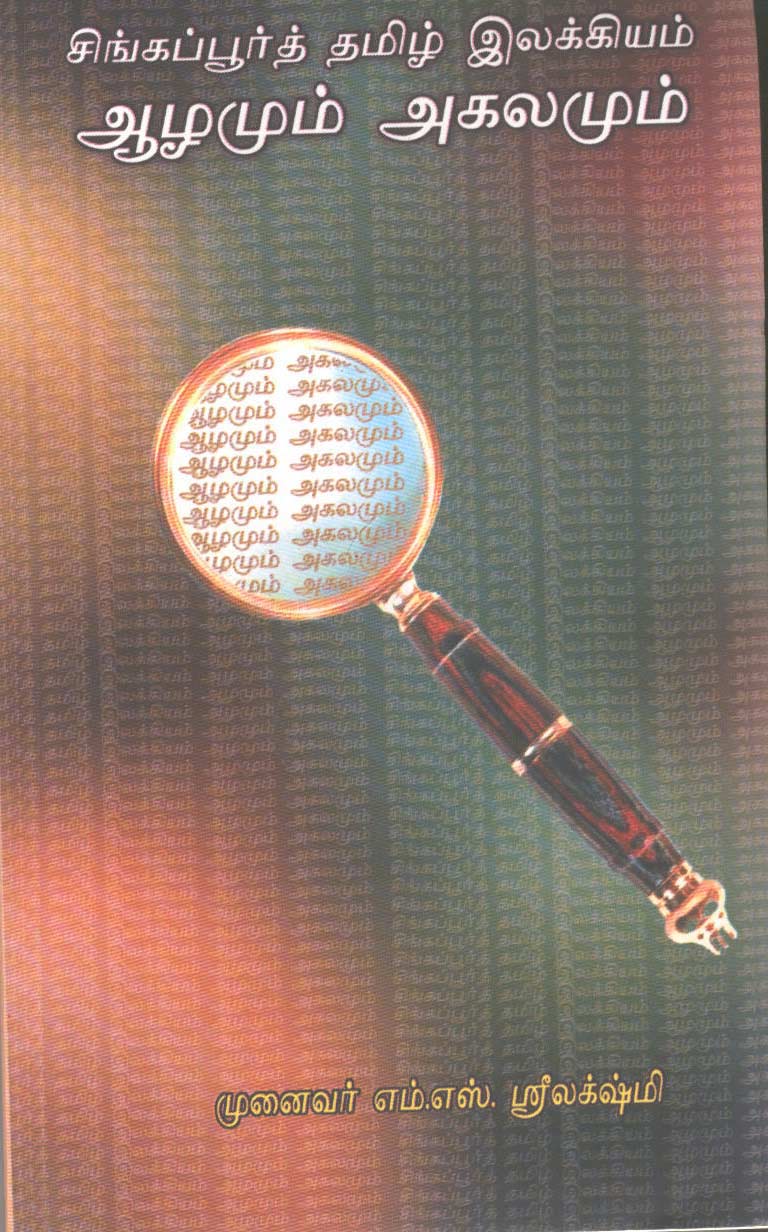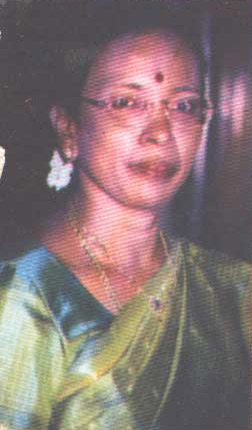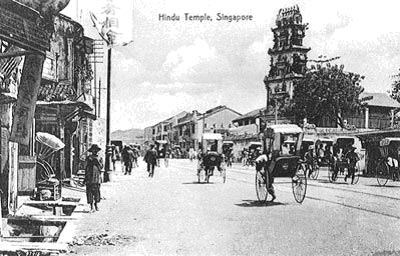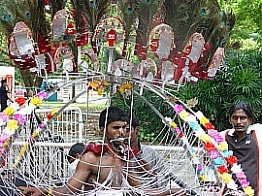AN APPEAL FOR SUPPORT
- We seek your support to meet expenses relating to some new and essential software, formatting of articles and books, maintaining and running the journal through hosting, correrspondences, etc. You can use the PAYPAL link given above. Please click on the PAYPAL logo, and it will take you to the PAYPAL website. Please use the e-mail address mthirumalai@comcast.net to make your contributions using PAYPAL.
Also please use the AMAZON link to buy your books. Even the smallest contribution will go a long way in supporting this journal. Thank you. Thirumalai, Editor.
BOOKS FOR YOU TO READ AND DOWNLOAD FREE!
- A STUDY OF THE SKILLS OF READING
COMPREHENSION IN ENGLISH DEVELOPED BY STUDENTS OF STANDARD IX IN THE SCHOOLS IN TUTICORIN DISTRICT, TAMILNADU ...
A. Joycilin Shermila, Ph.D. - A Socio-Pragmatic Comparative Study of Ostensible Invitations in English and Farsi ...
Mohammad Ali Salmani-Nodoushan, Ph.D. - ADVANCED WRITING - A COURSE TEXTBOOK ...
Parviz Birjandi, Ph.D.
Seyyed Mohammad Alavi, Ph.D.
Mohammad Ali Salmani-Nodoushan, Ph.D. - TEXT FAMILIARITY, READING TASKS, AND ESP TEST PERFORMANCE: A STUDY ON IRANIAN LEP AND NON-LEP UNIVERSITY STUDENTS - A DOCTORAL DISSERTATION ...
Mohammad Ali Salmani-Nodoushan, Ph.D. - A STUDY ON THE LEARNING PROCESS OF ENGLISH
BY HIGHER SECONDARY STUDENTS
WITH SPECIAL REFERENCE TO DHARMAPURI DISTRICT IN TAMILNADU ...
K. Chidambaram, Ph.D. - SPEAKING STRATEGIES TO OVERCOME COMMUNICATION
DIFFICULTIES IN THE TARGET LANGUAGE SITUATION - BANGLADESHIS IN NEW ZEALAND ...
Harunur Rashid Khan - THE PROBLEMS IN LEARNING MODAL AUXILIARY VERBS IN ENGLISH AT HIGH SCHOOL LEVEL ...
Chandra Bose, Ph.D. Candidate - THE ROLE OF VISION IN LANGUAGE LEARNING
- in Children with Moderate to Severe Disabilities ...
Martha Low, Ph.D. - SANSKRIT TO ENGLISH TRANSLATOR ...
S. Aparna, M.Sc. - A LINGUISTIC STUDY OF ENGLISH LANGUAGE CURRICULUM AT THE SECONDARY LEVEL IN BANGLADESH - A COMMUNICATIVE APPROACH TO CURRICULUM DEVELOPMENT by
Kamrul Hasan, Ph.D. - COMMUNICATION VIA EYE AND FACE in Indian Contexts by
M. S. Thirumalai, Ph.D. - COMMUNICATION
VIA GESTURE: A STUDY OF INDIAN CONTEXTS by M. S. Thirumalai, Ph.D. - CIEFL Occasional
Papers in Linguistics,
Vol. 1 - Language, Thought
and Disorder - Some Classic Positions by
M. S. Thirumalai, Ph.D. - English in India:
Loyalty and Attitudes
by Annika Hohenthal - Language In Science
by M. S. Thirumalai, Ph.D. - Vocabulary Education
by B. Mallikarjun, Ph.D. - A CONTRASTIVE ANALYSIS OF HINDI
AND MALAYALAM
by V. Geethakumary, Ph.D. - LANGUAGE OF ADVERTISEMENTS
IN TAMIL
by Sandhya Nayak, Ph.D. - An Introduction to TESOL:
Methods of Teaching English
to Speakers of Other Languages
by M. S. Thirumalai, Ph.D. - Transformation of
Natural Language
into Indexing Language:
Kannada - A Case Study
by B. A. Sharada, Ph.D. - How to Learn
Another Language?
by M.S.Thirumalai, Ph.D. - Verbal Communication
with CP Children
by Shyamala Chengappa, Ph.D.
and M.S.Thirumalai, Ph.D. - Bringing Order
to Linguistic Diversity
- Language Planning in
the British Raj by
Ranjit Singh Rangila,
M. S. Thirumalai,
and B. Mallikarjun
REFERENCE MATERIAL
- UNIVERSAL DECLARATION OF LINGUISTIC RIGHTS
- Lord Macaulay and
His Minute on
Indian Education - In Defense of
Indian Vernaculars
Against
Lord Macaulay's Minute
By A Contemporary of
Lord Macaulay - Languages of India,
Census of India 1991 - The Constitution of India:
Provisions Relating to
Languages - The Official
Languages Act, 1963
(As Amended 1967) - Mother Tongues of India,
According to
1961 Census of India
BACK ISSUES
- FROM MARCH 2001
- FROM JANUARY 2002
- INDEX OF ARTICLES
FROM MARCH, 2001
- JANUARY 2006 - INDEX OF AUTHORS
AND THEIR ARTICLES
FROM MARCH, 2001
- JANUARY 2006
- E-mail your articles and book-length reports (preferably in Microsoft Word) to mthirumalai@comcast.net.
- Contributors from South Asia may send their articles to
B. Mallikarjun,
Central Institute of Indian Languages,
Manasagangotri,
Mysore 570006, India or e-mail to mallikarjun@ciil.stpmy.soft.net - Your articles and booklength reports should be written following the MLA, LSA, or IJDL Stylesheet.
- The Editorial Board has the right to accept, reject, or suggest modifications to the articles submitted for publication, and to make suitable stylistic adjustments. High quality, academic integrity, ethics and morals are expected from the authors and discussants.
Copyright © 2006
M. S. Thirumalai
AMAZING SURVIVAL, GREAT GROWTH - DIASPORA LITERATURE IN INDIAN TONGUES
Sri Lakshmi's Record of Singapore Tamil Literature
M. S. Thirumalai, Ph.D.

AN IMPORTANT CONTRIBUTION TO THE STUDY OF DIASPORA LITERARY WORKS
This article reviews a seminal contribution, documenting the origin, development and growth of Indian Diaspora Tamil Literature in Singapore. This is an excellent work by Dr. Sri Lakshmi, written in lucid Tamil based on her deep research and understanding of the processes of literature creation in Diaspora lands.
We have just begun to record, preserve, think over and admire the sagacity of the Indian pioneers in foreign lands who labored hard for their livelihood and struggled endlessly to maintain their identity in some form or the other.
MODERN INDIAN DIASPORA AND LITERATURE
In recent decades, many writers of Indian origin, writing fiction in English with Indian themes, have received much acclaim in the West. Their focus relates, in some manner, to the life and times of the Indian Diaspora of the twentieth century. They go back in their reminiscences to their roots and try their best to relate themselves to that identity. But, hardly any one of these talented writers has written in their Indian tongues.
PROSPERITY AND RETENTION OF LANGUAGE AND CULTURE
That prosperity has nothing to do with the desire and determination to preserve one’s own language is daily proved in the growing lack of interest among the modern Indian Diaspora in retaining Indian tongues even in their daily conversations. In fact, prosperity has blunted any desire or need to use their tongues!
A UNIQUE HISTORY OF MALAYA AND SINGAPORE TAMILS
Tamils in Malaysia and Singapore, for more than a century, have not only preserved their identity through the retention of their language, culture and religion, but also have successfully developed written literature of their own. Their Tamil roots have been nurtured by the political, literary and media developments in Tamilnadu and Tamil Eelam, but the original initiative was born of a belief that their language, culture and religions are an integral part of their very being. Literates among these early migrants were conscious of the distinct Tamil heritage, a heritage that they all understood as not depending upon Sanskrit for its growth, continuation and dissemination.
REPRESENTING THE ENTIRE TAMIL COMMUNITY
Despite the fact that early Singapore Tamil migrants predominantly came from one or two Tamil castes, the entire population was well represented by a variety of castes, and had a substantial number of Tamil Muslims. They came largely from a non-Brahmin background with a history of deep traditional Tamil learning and were cemented together by the common medium of Tamil. A good number of them came also from bilingual non- Brahmin Tamil castes whose contribution to the growth and spread of Tamil Bhakti literature has been stupendous. Significantly, Tamil castes including Muslims did not ever believe that it was against their religion or culture to cross the seas and earn their livelihood. In fact, their literature clearly encouraged them to cross the seas and make a living!
THE ORIGINS OF INDIAN DIASPORA IN “FOREIGN” LANDS
When did the movement of Indians as groups of people to foreign lands begin?
Modern movements may be related to the expansion of the British Colonial power beyond India. However, we should really look at the founding or the roots of Indian Diaspora in the historic conversion of Emperor Asoka to Buddhism. Asoka’s missionary zeal encouraged daring and dedicated Buddhists to travel to many nations, establish their own community of monks and believers. It is not clear whether this missionary movement really enabled the movement of ordinary Indian people to foreign lands. However, political patronage must have resulted in a good number of families and professionals to travel as migrants to other nations.
EARLY TRENDS IN MALAYA-SINGAPORE TAMIL LITERATURE

Dr. Sri Lakshmi’s book under review is an excellent compilation of her articles presented in various international seminars. The book is divided into 12 well written chapters. The first chapter is on a great Tamil scholar, considered to be a pioneer of Tamil literature in Malaya-Singapore: C. N. Sadasiva Pandit. The word Pandit here does not refer to any caste affiliation. It simply means a vidwan, in particular a Tamil vidwan, a person of great knowledge and understanding of Tamil.

Early Tamil writers in Malaya and Singapore, following the trends in Tamilnadu and Tamil Eelam, chose to compose poetry, and not use prose for their literary composition. By the time Sadasasiva Pandit wrote his poetry, Tamils have already settled down in Malaya and Singapore, and have built impressive places of worship for the gods, and Masjids for Islamic worship. His early Tamil work was on a Hindu god Murugan, typically described as the god of Tamils, with a tradition of worship and adoration for at least 1800 years among the Tamils. The poet did not fail to notice that they were worshipping this god in a land away from their traditional homeland, but at the same time he had enormous appreciation for Singapore and its multi-ethnic population. The book was printed in a print shop owned by a Tamil Muslim.

Culture in Second and Foreign Language Teaching | Desire Kannada? Desire English? Want Both! | Nature and Definitions of Business Communication | Rules to Make a Simple (Positive) Sentence into Tag Question in English and Telugu | Amazing Andamans and North-East India - A Panoramic View of States, Societies and Culture - Pages from the Diary of an English Language Teacher |Amazing Survival, Great Growth - Diaspora Literature in Indian Tongues: Sri Lakshmi's Record of Singapore Tamil Literature | Information and Communication Technology Tools in Language Learning | HOME PAGE OF FEBRUARY 2007 ISSUE | HOME PAGE | CONTACT EDITOR
M. S. Thirumalai, Ph.D.
Bethany College of Missions
6820 Auto Club Road, Suite C
Bloomington, MN 55438
U.S.A.
mthirumalai@comcast.net
- Send your articles
as an attachment
to your e-mail to
mthirumalai@comcast.net. - Please ensure that your name, academic degrees, institutional affiliation and institutional address, and your e-mail address are all given in the first page of your article. Also include a declaration that your article or work submitted for publication in LANGUAGE IN INDIA is an original work by you and that you have duly acknolwedged the work or works of others you either cited or used in writing your articles, etc. Remember that by maintaining academic integrity we not only do the right thing but also help the growth, development and recognition of Indian scholarship.

